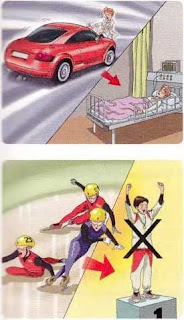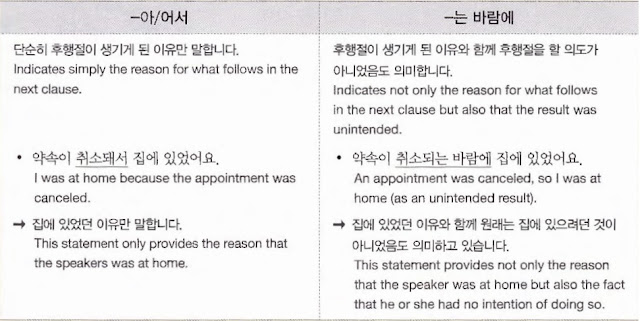 가: 마크 씨가 병원에 입원했다면서요?
가: 마크 씨가 병원에 입원했다면서요?
I hear that Mark is in the hospital.
나: 네, 교통사고가 나는 바람에 다쳐서 병원에 입원했대요.
Yeah, he was injured in a traffic accident and went to the hospital (as a result).
가: 그 선수가 금메달을 딸 줄 알았는데 왜 못 땄지요?
I thought that athlete would win the gold medal. I wonder why he didn’t.
나: 경기를 하다가 넘 어지는 바람에 금메달을 못 땄어요.
He had a fall during the match and didn’t get the gold medal (as a result).
This expression is used when the preceding clause describes the cause or reason for the statement in the following clause. Usually, the preceding clause describes a situation or circumstance that negatively influences the following clause or that causes an unexpected or unwanted result.
 • 휴대전화가 갑자기 고장 나는 바람에 연락을 못했어요.
• 휴대전화가 갑자기 고장 나는 바람에 연락을 못했어요.
My mobile phone suddenly had a problem, so I couldn’t contact you (as a result).
• 태풍이 오는 바람에 비행기가 취소됐어요.
There was a typhoon, and the flight was canceled (as a result).
• 급하게 먹는 바람에 체했어요.
I ate in a rush and got indigestion (as a result).
1. Only verbs can precede -는 바람에.
• 날쓰가 갑자기 추운 바람에 감기에 걸렸어요. (X)
->날씨가 갑자기 추워진 바람에 감기에 걸렸어요. (O)
‘춥다’ cannot be used because it is an adjective. It must be changed into its verb form 추워지다.
2. Because this form is used to describe the reason for something that has already occurred, the following clause must be in the past tense.
• 비가 많이 오는 바람에 홍수가 날 것 같아요. (X)
->비가 많이 오는 바람에 홍수가 났어요. (O)
3. Because only past tense forms can follow -는 바람에, imperative or propositive clauses cannot be used,
• 신용카드를 잃어버리는 바람에 은행에 가십시오. / 갈까요? (X)
->신용카드를 잃어버 리는 바람에 은행에 갔습니다. (O)
4. This expression is mostly used in a negative sense, so it sounds unnatural to use it to describe positive situations.
• 남자 친구가 선물을 사 주는 바람에 기분이 좋아졌습니다, (X)
->남자 친구가 선물을 사 주어서 기분이 좋아졌습니다. (O)
However, in some cases, this form can be used to describe positive situations, but they are limited to cases in which something completely unexpected or unintended has occurred.
가: 윤주 씨, 기분이 좋아 보이네요.
Yunju, you seem to be in a good mood.
나: 언니가 갑자기 부산으로 이사를 가는 바람에 방을 혼자 쓰게 되었거든요.
My sister suddenly moved to Busan, and I’ve got a room all to myself (as a result).
While both -아/어서 and -는 바람에 are used to express reasons, they are different in the following respects.

>> You can click on the title of each grammar below to learn the other grammars that also expresses ‘Reasons’:
01. -거든요
02. -잖아요
03. -느라고
04. -는 바람에
05. -(으)ㄴ/는 탓에
06. -고 해서
07. -(으)ㄹ까 봐
>> Full of Intermediate grammar: Click here

"갑자기 날씨가 추워진 바람에 감기에 걸렸어요"
여기는 왜 "ㄴ 바람에" 붙여 있는데요?
"추워지는 바람에"는 맞지 않아요?